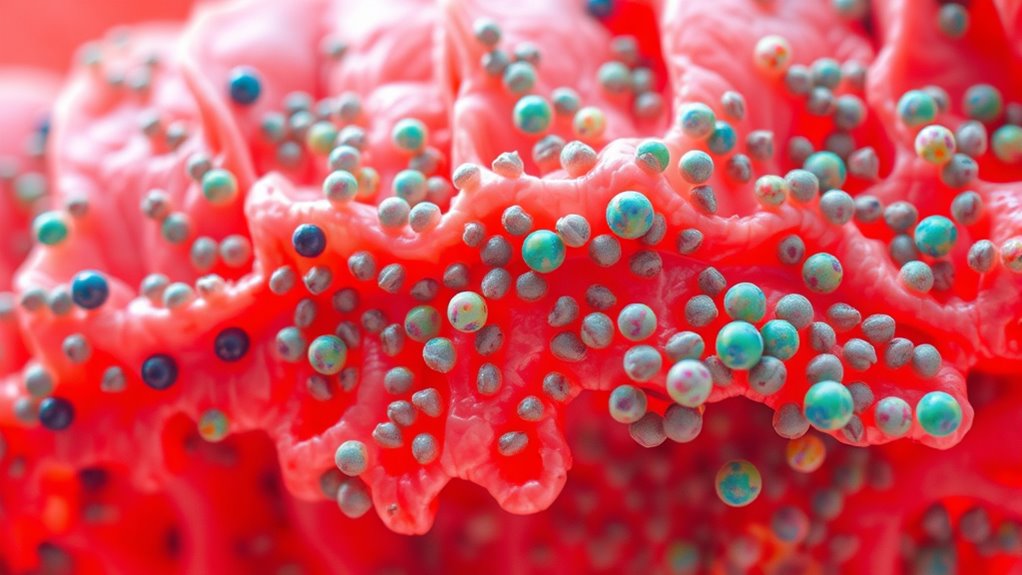Your gut health plays a key role in how your body processes food, absorbs nutrients, and manages energy. When your gut bacteria are balanced, they help break down complex foods and boost nutrient absorption, supporting a healthy metabolism. An imbalance or poor diet can disrupt this process, slowing metabolism and affecting weight and energy levels. To discover simple ways to keep your gut healthy and optimize your metabolism, keep exploring how lifestyle factors make a difference.
Key Takeaways
- Healthy gut bacteria improve nutrient absorption, supporting efficient energy use and metabolic processes.
- A balanced microbiome aids digestion, reducing fatigue and weight gain associated with poor metabolism.
- Diet influences gut microbial diversity, which impacts metabolic health and weight management.
- Lifestyle factors like exercise and sleep promote a healthy microbiome, enhancing metabolism and blood sugar regulation.
- Supplements and mindful habits can support gut bacteria, thereby boosting overall metabolic function.

Your gut health plays an essential role in regulating your metabolism, influencing how efficiently your body processes food and converts it into energy. Central to this process are your gut bacteria, tiny microorganisms that reside in your digestive system. These microbes are more than just passive residents; they actively participate in breaking down food, extracting nutrients, and helping your body function at its best. When your gut bacteria are balanced and thriving, your digestion efficiency improves, meaning your body can absorb nutrients more effectively and convert food into energy more smoothly. Conversely, an imbalance in gut bacteria can slow down digestion, leading to issues like bloating, fatigue, and even weight gain. Wrths are a key factor in maintaining a healthy gut microbiome, supporting overall metabolic health.
The relationship between gut bacteria and digestion efficiency is complex but essential. Healthy gut bacteria produce enzymes that help break down complex carbohydrates, fibers, and proteins that your own enzymes might struggle with. This not only guarantees you get the maximum nutrients from your meals but also reduces the likelihood of food intolerances and digestive discomfort. When digestion efficiency is high, your metabolism runs more smoothly because your body isn’t wasting energy trying to process poorly digested food. Instead, it can focus on other indispensable functions like cell repair, hormone regulation, and energy expenditure.
Your diet plays a significant role in shaping the composition of your gut bacteria. Consuming a diverse range of fiber-rich foods, fermented products, and probiotics can bolster the growth of beneficial microbes. These good bacteria help maintain a healthy gut environment, which in turn supports efficient digestion. On the other hand, diets heavy in processed foods, sugars, and unhealthy fats can disrupt the balance of your gut bacteria, leading to dysbiosis. This imbalance hampers digestion efficiency and can slow down your metabolism, making it harder to maintain a healthy weight or energy level.
Your lifestyle choices also impact your gut bacteria and, consequently, your metabolism. Regular exercise, adequate sleep, and stress management contribute to a balanced gut microbiome. When your gut bacteria are in harmony, your body is better equipped to process nutrients, regulate blood sugar, and burn calories efficiently. Understanding that your gut health is interconnected with your metabolic health empowers you to make small but impactful changes. By nurturing your gut bacteria through mindful eating, lifestyle habits, and possibly supplements, you support a more efficient metabolism, helping you stay energized, healthy, and balanced. Additionally, hydration plays a crucial role in maintaining optimal gut function and supporting your microbiome’s health.
Frequently Asked Questions
Can Poor Gut Health Cause Weight Gain Despite a Healthy Diet?
Yes, poor gut health can cause weight gain even if you eat healthy. When your gut bacteria are out of balance, it can interfere with weight regulation by affecting how your body digests food and stores fat. This imbalance may lead to increased hunger, cravings, and fat accumulation. So, maintaining a healthy gut flora is essential for proper weight management and overall metabolic health.
How Long Does It Take to See Metabolic Improvements From Gut Health Changes?
Think of your gut microbiome as a garden needing consistent care. You might start noticing metabolic improvements within a few weeks, but for lasting change, it often takes around three to six months. Everyone’s metabolic timeline differs based on factors like diet and lifestyle. Stay patient and persistent, because nurturing your gut health can lead to a healthier metabolism over time, turning your efforts into long-term rewards.
Are Specific Foods More Effective for Improving Gut Health and Metabolism?
You can boost your gut health and metabolism by focusing on fiber diversity and incorporating fermented foods into your diet. Fiber from various sources nourishes different beneficial bacteria, promoting a balanced microbiome. Fermented foods like yogurt, kefir, and sauerkraut introduce probiotics that support digestion and metabolic health. Combining these foods regularly helps improve gut function, enhances nutrient absorption, and may lead to better energy levels and metabolic efficiency over time.
Does Gut Health Influence Energy Levels Throughout the Day?
It’s funny how many overlook the gut microbiome’s role in energy fluctuations. You might think your energy levels are just about sleep or stress, but a healthy gut actually stabilizes those highs and lows. When your microbiome thrives, it helps regulate nutrient absorption and blood sugar, giving you steadier energy. So yes, gut health directly influences your daily energy, keeping you more balanced and less prone to midday crashes.
Can Probiotics Alone Significantly Boost Metabolism?
Probiotic benefits can support your overall health, but they alone won’t substantially boost your metabolism. Your gut microbiome plays a vital role in digestion and nutrient absorption, which influences metabolic rate. While adding probiotics helps maintain a healthy gut environment, combining them with a balanced diet and regular exercise offers the best chance to enhance your metabolism effectively. So, don’t rely solely on probiotics for metabolic improvements.
Conclusion
By nurturing your gut health, you’re tending to the fertile soil where your metabolism blossoms. Think of your gut as a delicate orchestra, each microorganism playing a essential role in harmony. When it’s in tune, your energy flows like a vibrant river, fueling every part of your life. Neglect it, and the melody falters, leaving you out of sync. Prioritize your gut, and watch your metabolism flourish like a garden in full bloom.









